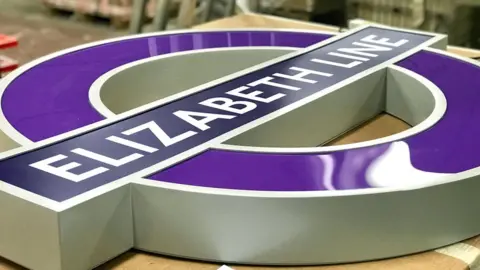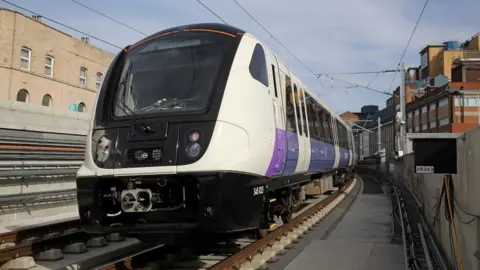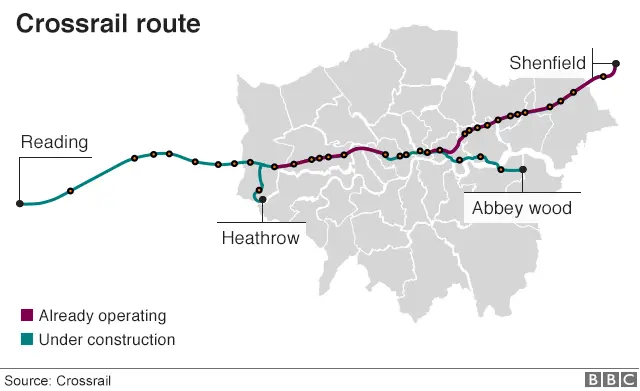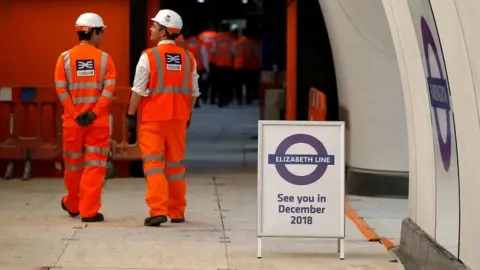Crossrail delay: £1.4bn bailout as autumn 2019 launch delayed
 Transport for London
Transport for LondonA £1.4bn bailout has been announced for Crossrail, as Europe's biggest infrastructure project is pushed back beyond its launch date of autumn 2019.
London’s £15bn route, to be known as the Elizabeth Line, had originally been due to open this month.
The rescue plan - the third this year - will be used to plug a predicted £2bn hole in the project's finances.
The scheme will connect major landmarks such as Heathrow Airport and the Canary Wharf business district.
Mayor of London Sadiq Khan said the deal means "Crossrail's new leadership can get the job done".
 Reuters
ReutersTransport for London (TfL) estimates it will miss out on at least £20m in revenue due to the delay.
Between £1.6bn and £2bn is needed to complete the project, a review by accountancy firm KPMG found.
The scheme is currently running almost £600m over budget, and the previous bailouts have not come without criticism.
The project received a £590m cash injection in July, followed by an "interim" £350m loan announced in October.
It was announced in August that the route was to open nine months after the original scheduled launch of December 2018 to allow more time for testing.
Crossrail said on Monday that the launch had once again been pushed back, and a new "robust and deliverable schedule" would be announced later.
Elizabeth Line trains are already operating between Shenfield and Liverpool Street, and between Paddington and Hayes & Harlington.

When open, the project will help ease London's chronic congestion.
Trains will run from Reading and Heathrow in the west through 13 miles of new tunnels to Shenfield and Abbey Wood in the east, when fully operational.
Crossrail says the new line will connect Paddington to Canary Wharf in 17 minutes and described the 10-year project as "hugely complex".
An estimated 200m passengers will use the new underground line annually, increasing central London rail capacity by 10% - the largest increase since World War Two.

Analysis
Tom Edwards, BBC London Transport Correspondent
Crossrail was the industry's mega star.
The largest infrastructure project in Europe once had its own documentary and was even the backdrop for adverts for nice 4x4s.
But the project's catchphrase "on time and on budget" has been totally obliterated. And it is Londoners who will have to pay through increased borrowing.
All kinds of questions need answering: if the project was in such bad shape why didn't anyone spot it? Who knew what when?
This is also a terrible scenario for Transport for London. Its finances were already in a bad way with a £1bn deficit. This will have consequences for Tfl. It'll probably mean cuts.
Crossrail could one day be a great service and large complicated projects often suffer delays, but this latest announcement goes beyond embarrassment into the realms of calamity.

Under the new deal the Greater London Authority (GLA) will borrow up to £1.3bn from the Department for Transport, and provide an extra £100m itself.
The GLA will repay this loan through business rates.
Mike Brown, TfL's commissioner, said the extra costs would mean bosses will "have to look at" other transport projects in the capital "but that will all come out in the next few days."
The announcement comes amid a row over when Mr Khan knew about the delays.
Sir Terry Morgan, the former chairman of Crossrail Ltd, said the firm had "raised concerns" about progress with the mayor in July but had still been working towards a December launch.
Mr Khan claimed he only found out about the delay two days before it was made public in late August, despite having regular briefings with the Crossrail board.
The mayor said: "This agreement means that, working with TfL and the Government, Crossrail's new leadership can get the job done."
A DfT spokesman said: "The government remains committed to the rapid completion of the project, in a way that is fair to UK taxpayers."
 Reuters
Reuters